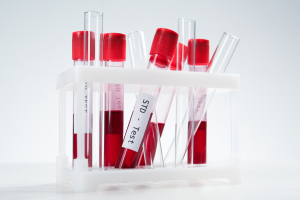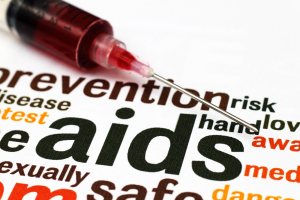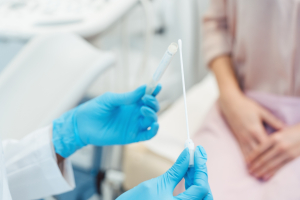Sexually transmitted infections (STIs) are infectious diseases that can spread from one person to another primarily through sexual contact. If a sexually transmitted infection causes symptoms, it is considered to be a disease (sexually transmitted disease – STD).
 They’re caused by bacteria, viruses, or parasites that live in the body. The infection can be transmitted in several ways depending on a person’s sexual behavior:
They’re caused by bacteria, viruses, or parasites that live in the body. The infection can be transmitted in several ways depending on a person’s sexual behavior:
- oral sex (mouth-to-genital contact),
- anal sex (rectal-to-genital contact),
- vaginal sex (vaginal-to-genital contact), or
- skin-to-skin contact with an infected area of the body.
Some forms of STDs can also spread from mother to child during pregnancy or childbirth.
STIs and STDs are common but preventable diseases that can have a severe impact on health, relationships, and daily life.
In our guide, you can get essential information about STDs, their symptoms, when to get tested for STDs, and how to protect yourself from being infected. Being informed about STDs is the best way to protect yourself and others.
How are STDs diagnosed?
Some sexually transmitted diseases and infections may be diagnosed during a physical exam or through microscopic examination of a sore or fluid swabbed from the vagina, penis, or urethra (urinary tract).
Several sexually transmitted diseases have little to no signs or symptoms, and not all sexually transmitted infections turn into diseases. It is essential to get tested when there is a chance of potential exposure, even without showing symptoms yet.
At FirstMed, we understand our patients’ specific needs and offer a set of STD test packages:
 STD Panel Quick Test processes a blood sample for analysis in our in-house lab. The test can reveal the presence of HIV/AIDS, syphilis, and Hepatitis very quickly, usually within 45 minutes. If the result is positive, a confirmatory test should be conducted at an external laboratory. In this case, you will get the final results one week later.
STD Panel Quick Test processes a blood sample for analysis in our in-house lab. The test can reveal the presence of HIV/AIDS, syphilis, and Hepatitis very quickly, usually within 45 minutes. If the result is positive, a confirmatory test should be conducted at an external laboratory. In this case, you will get the final results one week later.- The STD Panel PCR Test detects diseases that may not show up in standard blood tests, such as HPV, sexual herpes, gonorrhea, or chlamydia. The samples will be analyzed in a lab, which will take approximately one week. Choose this test if you suspect a specific body part might have been infected or if any symptoms are present. The test is performed by taking urine samples or swabbing the inside of your mouth, genitals, or rectum.
- Our STD Test Combo Package includes both tests and can detect the most STDs. This is the best option if you need a thorough screening.
If you are not sure which kind of STD test would be the best for you, consult our doctor, who can help you determine which tests are necessary based on your sexual history and symptoms.
What are the most common STDs?
Read more below about specific STDs, their symptoms and treatments:
HIV / AIDS
HIV is the virus that causes Acquired Immunodeficiency Syndrome (AIDS). In 2021, over 38 million people worldwide were living with HIV/AIDS, and 650,000 people died from it.
 Human immunodeficiency virus (HIV) affects the immune system—the body’s natural defense against germs, infections, and diseases—by attacking T-cells (a type of white blood cell). When HIV destroys these cells, a person becomes vulnerable to illnesses like pneumonia or tuberculosis.
Human immunodeficiency virus (HIV) affects the immune system—the body’s natural defense against germs, infections, and diseases—by attacking T-cells (a type of white blood cell). When HIV destroys these cells, a person becomes vulnerable to illnesses like pneumonia or tuberculosis.
HIV is transmitted through contact with the blood, semen, vaginal fluids, or breast milk of someone who has been infected with the virus. This can happen in several ways, such as
- having unprotected sex (vaginal, anal and oral) (where there’s no condom),
- sexual activities that involve exchanging body fluids (like deep kissing),
- sharing needles or getting a tattoo from someone who has the virus,
- during pregnancy, childbirth, and breastfeeding.
Generally, it can take up to 8-10 years from the time the virus settles in for the disease to develop.
HIV signs and symptoms
A person who is infected with HIV but doesn’t have symptoms yet is considered “asymptomatic.” This means that although there may be some inflammation in their body caused by the virus itself or other infections related to it (like syphilis), overall health looks fine on paper:
- blood tests come back negative for antibodies specific to any known STDs;
- physical exams show no signs of illness;
- doctors cannot detect any physical symptoms such as fever or fatigue.
Here are some signs to look for that may indicate HIV infection:
- flu-like symptoms (with or without fever) that last longer than a few days
- swollen lymph nodes in your neck, groin, or armpits
- a sore throat that doesn’t go away after several weeks, especially if it’s accompanied by fever and fatigue
- recurrent fungal infections like athlete’s foot or ringworm
- chronic diarrhea
- unusual fatigue, especially if it persists for weeks at a time.
Possible detection
If a potential exposure occurs, the best thing is to take a test two weeks later. Even if the initial result is negative, it’s a good idea to get tested again after a few weeks because it may take longer for the antibodies to show up. The antibody test can then show other infections, such as syphilis or hepatitis.
If the HIV test becomes positive, consult a doctor as soon as possible. Your physician can begin antiretroviral treatment (ART) and periodically monitor your condition using clinical and laboratory parameters, which include the test to measure the virus in the blood (viral load). Taking ART consistently may also prevent the transmission of HIV to others.
Hepatitis B and C
Hepatitis is an inflammation of the liver, usually caused by a viral infection. Among the viruses that cause hepatitis, types B and C (HBV and HCV) can be sexually transmitted, while the others are spread through contaminated food.
Hepatitis B and C viruses can be passed from one person to another in different ways:
- sexual intercourse with an infected person;
- intravenous drugs (using a shared needle);
- from mother to child during childbirth or breastfeeding.
It significantly decreases the risk of getting these forms of hepatitis if you have been vaccinated against it or if your partner has been screened for the virus before having sex with you. The infection is most widespread in Asia and African countries. Thanks to mandatory vaccinations, the number of infected people in Europe is 14-15 million, while worldwide approx. 350 million.
Hepatitis B and C symptoms
Hepatitis B symptoms include fever and weakness, followed by jaundice (when the whites of a person’s eyes turn yellow). Next, their skin turns yellow. The stool becomes light in color, and urine turns brown; the liver is also enlarged under the right rib cage.
Hepatitis C is usually symptomless; however, it may cause fever and other flu-like symptoms in rare cases.
If left untreated, hepatitis B and C infection can lead to liver cancer.
Possible detection
Only tests can detect Hepatitis B or C infection; however, the test shows the possible infection six weeks after the possible occurrence. If your test is negative but you remain concerned about the possibility of infection, another set of tests may be run six months or later from that date.
Syphilis
Syphilis is caused by the bacterium Treponema pallidum, which is spread through direct contact with syphilis sores (known as a chancre). These can be found on the lips, mouth, genitals, or anus of an infected person. The sores are usually painless and go unnoticed.
The infection can be transmitted through direct contact with an infected sore during sexual intercourse or other intimate physical contact. Pregnant women may pass syphilis to the fetus during pregnancy or childbirth. This may lead to stillbirths or premature delivery of an infected baby who may also have congenital disorders.
The disease can affect multiple body parts, including the skin, bones, and nervous system.
Syphilis signs and symptoms
Common symptoms of syphilis are:
- a sore on the genitals or mouth,
- a rash that looks like small red sores or pimples,
- headaches and fatigue.
Possible detection
Antibody blood tests can reveal the infection after 4-5 weeks, but getting tested again a few weeks may be necessary. It’s important to know that the blood antibody level changes, which means, the test result may remain negative even with untreated syphilis and can be positive for life after treatment.
Treatment
Syphilis can be cured with antibiotic therapy, but it may take several weeks or months for symptoms to disappear. If left untreated, it can cause serious health problems.
Chlamydia
Chlamydia is an infection caused by Chlamydia trachomatis bacteria. It’s usually transmitted during sexual activity but can also be passed on through other ways if blood or other bodily fluids are shared.
Chlamydia signs and symptoms
An infected person may have mild urinary complaints (hips, burning in the urethra) 3-4 days after infection. Urethritis may cause bloody urine. Women may experience vaginal bleeding between periods, after intercourse, or after menopause.
However, many people do not experience any symptoms. Three-quarters of women and half of men carry the infection asymptomatic, and it does not cause any complaints.
Possible detection
STD PCR tests can identify chlamydia infection in a urine sample by laboratory analysis.
Treatment
If the infection is detected early, it can be treated with antibiotics. If left untreated, chlamydia can cause serious complications such as pelvic inflammatory disease (PID), ectopic pregnancy, and in rare cases, infertility. For pregnant women, chlamydia can cause premature delivery, low birth weight eye infections in newborns, and pneumonia in infants under six months who have been exposed to chlamydia during delivery.
Gonorrhea
Gonorrhea is caused by the bacterium Neisseria gonorrhoeae, which infects the genitals, rectum, and throat. It’s spread through sexual contact, including vaginal, anal, and oral sex with an infected partner, and can only be detected from the site of infection.
It can also be passed from an infected mother to her baby during childbirth if she doesn’t receive treatment beforehand–this is why pregnant women should get tested regularly for STDs.
Gonorrhea signs and symptoms
Most people who have gonorrhea don’t experience any symptoms; therefore, it can be detected only by testing. A gonorrhea test usually involves taking a urine sample or swab from the throat, rectum, or vagina.
Warning signs can be:
- burning sensation when urinating;
- discharge from the penis or vagina; or
- bleeding between periods.
Treatment
Gonorrhea can successfully be treated by antibiotics, but it can take several days to weeks before you feel better. If you think you have gonorrhea, visit a doctor as soon as possible.
If left untreated, gonorrhea can cause serious health problems in both men and women, including infertility, pelvic inflammatory disease (PID), ectopic pregnancy (when the embryo implants outside of the uterus) if you become pregnant while infected with gonorrhea, and an increased risk for HIV transmission.
Mycoplasma, ureaplasma and trichomoniasis
Mycoplasma, ureaplasma, and trichomoniasis bacteria can cause genital or urinary tract infections, but they’re not as common as chlamydia or gonorrhea. The disease may also be transferred from an infected partner with no symptoms of their own.
In rare cases, mycoplasma can cause pneumonia or other complications in people with weakened immune systems (such as those with HIV/AIDS).
Symptoms of mycoplasma, ureaplasma, and trichomoniasis
Symptoms may include:
- burning sensation when urinating.
- painful urination (especially with mycoplasma)
- irritation or itching around the genitals
- unusual discharge from the genitals (in some cases).
Possible detection
Testing is performed on urine or genital secretions; blood tests cannot detect yeast infections.
Treatment
Mycoplasma is most often asymptomatic and self-limited, which means it goes away on its own without treatment. Ureaplasma and trichomoniasis also tend to be milder than chlamydia or gonorrhea.
Mycoplasma, ureaplasma, and trichomoniasis can be treated with antibiotics. Do not hesitate to seek treatment if you have symptoms or your test becomes positive.
Genital herpes
Genital herpes is a common STD that affects the genitals, mouth, and throat. It is caused by the herpes simplex virus (HSV).
There are two types of HSV:
- HSV-1 usually causes cold sores around the mouth,
- HSV-2 usually causes genital herpes
but both types can infect other parts of the body as well.
Genital herpes is spread from person to person through sexual contact with an infected partner. Sexual intercourse (vaginal or anal) and oral sex are the most common ways to get infected with HSV-2.
Genital herpes signs and symptoms
Infected people may have sores on or around their genitals and anus, which can be painful and last for several weeks before healing completely; however, some people never notice any symptoms at all!
Other symptoms include:
- painful urination,
- headache/fever/nausea/vomiting (stomach flu),
- swollen glands around the groin area (lymph nodes),
- muscle aches, especially in the lower back region and
- swollen eyes due to conjunctivitis (pink eye).
Possible detection
A PCR test for HSV-2 is the most accurate way to confirm whether you have genital herpes. Testing is carried out on a sample of fluid taken from the sores. This fluid contains DNA (deoxyribonucleic acid), which is then tested for HSV-2 antibodies, the protein your immune system makes when fighting an infection.
If you think you or your partner might have herpes, make an appointment with a doctor for an exam and get tested. Herpes is not curable, but some medications can help reduce the symptoms of an outbreak.
Treatment
Genital herpes sores tend to heal within two weeks. If left untreated, it could cause serious problems such as blindness or even death!
HPV (Human Papillomavirus)
Human Papillomavirus (HPV) is one of the most common STIs. The virus is usually transmitted through skin-to-skin contact, most commonly during sexual intercourse, infecting the mucus membranes of the mouth, throat, or genitals. It can also be transmitted through oral and anal sex or even nonsexual contact with the infected area.
HPV is a family of about 200 viruses, many of which are harmless, although some can also cause genital warts and severe health problems—including cervical cancer.
HPV symptoms
The infection is usually asymptomatic, temporary, or may not cause illness at all. But even if HPV displays no symptoms, it may still cause infection—so it’s necessary to get tested if you want to know your status!
Possible detection

The incubation period for HPV ranges from a few weeks to several months. The infection can be detected by taking a sample of cells from the lower part of the vagina or anus and examining them for signs of HPV DNA. A Pap test (also called a cervical smear) is also one way to gather those cells so they can be studied.
Women should get tested for HPV regularly; this screening is an integral part of the annual gynecological exam.
Prevention
Vaccines can prevent certain types of HPV infections from developing into full-blown diseases, but they don’t provide treatment for current infections or past ones.
Avoid health problems caused by STDs
Some STDs spread from one partner to another during sexual contact, while others through contact with infected fluids like semen, vaginal fluid, and blood. Some STDs can be cured, especially if detected early, while others require lifelong treatment or regular checkups for monitoring purposes.
These ways lower the chances of getting an STD:
- Using a condom during sexual intercourse.
- Being in a monogamous relationship with an uninfected partner or limiting the number of sexual partners you have.
- Waiting to become sexually active until after age 18 (if possible).
- Get tested regularly.
If you think you may have contracted an STD or STI, make an appointment for testing as soon as possible. If the test gets positive, or if you have any symptoms, see a doctor so they can start with the proper treatment.
The earlier you know about being infected, the better your chance of getting treatment before it gets worse. If left untreated, a sexually transmitted disease can lead to serious health problems or even death!




